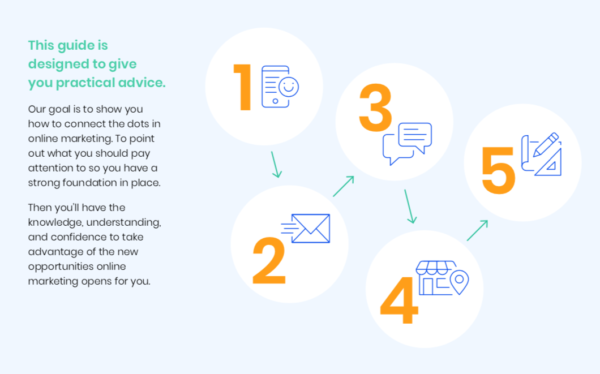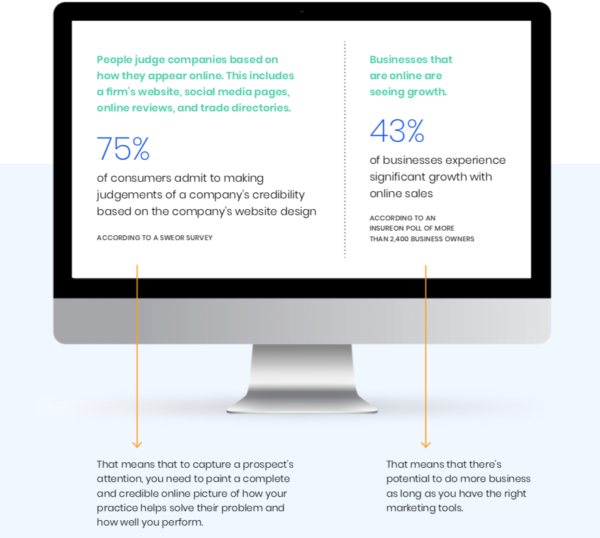
How are people finding your business online?
Modern-day Main Street looks quite different from the storefronts and sidewalk sales of old. Phone and business directories no longer lay on your doorstep all too often. Current trends show that most clients do their buying research on the internet. In lieu of print ads and bold street signs, professional services firms and consultants are flocking to the digital realm to perfect their online presence.
Professional services companies face a unique challenge in the new digital world. Because the marketing efforts of attorneys, accountants, architects, and similar professions have relied so long on personal connections, they must find a way to translate that trust through digital messaging.
The new “word of mouth” now happens online. Fortunately, updated marketing tools deliver the same results as an old-fashioned handshake when deployed purposefully. And, online marketing allows you to strengthen existing relationships with current customers while also building new connections.
Introducing the ultimate online marketing guide for professional services
We get it — professional service providers are busy. To help you understand the must-knows of online marketing, I teamed up with Constant Contact to produce a free guide called The Download: Making Sense of Online Marketing for Professional Services.
This 62-page guide contains everything you need to know to optimize your marketing, garner more leads, and grow your business.
In this free download, you’ll learn about five key pillars of online marketing:
- Mobile-responsive website — the hub of all your online marketing activities.
- Email marketing — it’s how you nurture relationships with clients and potential clients.
- Social media — choosing one channel to start with, you’ll use social media to generate new leads, engage current customers, and become more discoverable online.
- Listing and review sites — Claiming your listings on, for example, Google Business Profile, Yelp, and other listing sites can help you manage your reputation and get discovered by more customers.
- Content marketing — Offering useful content online helps you get found and builds trust with prospects.

How people find attorneys, accountants, architects, and other professional service providers online

Imagine your thought process if you heard about a great new business and immediately went to search for their business website. But you can’t seem to find it. Does this firm even exist? What kind of reputable business doesn’t have a proper web presence in 2020?
Your website is your business’ new first impression generator. Most of your potential clients will visit your website seeking the information they need to solve their problem.
Professional services businesses and consultants face the challenge of clearly communicating their message to potential clients about areas in which the client is not an expert. When you create content that showcases your knowledge and experience, this presents you as an expert and raises your credibility online.
The alphabet of online marketing, including abbreviations like SEO, PPC, CTR, and many more, can be overwhelming. Navigating the sea of tools and strategies can be a full-time job (and often more).
At my firm Solutions for Growth, we employ integrated marketing strategies, managing the more nuanced aspects of online advertising. Integrated marketing uses layers of tools and complementary automations to create an ongoing sales funnel for your professional service company.
The primary ways new clients find your business are
- Google Ads (PPC)
- Organic (non-paid) search results (SEO)
- Google Business Profile listing
- Social Media (organic and paid)
- Online Reviews
- Information from other sites (referrals)
Using Google Ads, your business advertisement appears at the top of the search results page. In the simplest of terms, you will choose search terms (keywords) popular for your business and pay for placement on Google. You only pay when someone clicks your link. This is a way to quickly and effectively attract qualified leads to your website and the services you offer. Results can be easily measured to determine if the link clicked resulted in a conversion — and, ultimately, a new client
Organic search results (Search Engine Optimization or SEO) take more time to attain but are more likely to be clicked. Roughly 70% of people will not click paid ads, whereas having your website rank organically provides staying power on search engines. A good SEO strategy relies on hundreds of factors, but the main ones are on-page content, page load speed, keyword-rich copy, inbound links, etc.
On Google, a complete Google Business Profile page is crucial to your presence in search results. Google tries to feature the businesses that provide the easiest access to the end user. Making sure your business information is claimed and up to date should be a top priority. Your Google Business Profile page connects to other aspects of your Google presence (like Maps and Reviews) to build a complete picture of your professional services company in a convenient and accessible location for clients.
Other tools that drive early impressions are online reviews (which also factor heavily in the final purchase decision) and social media activity.
When clients find you, do you give them what they need?
Once you convince someone to visit your website, it’s vital to quickly catch their attention and hold their interest. Modern web design relies on full-screen imagery and quick, purposeful messaging. Many liken the prospect of catching a potential customer’s attention on your website to catching their attention on a busy highway billboard. You are competing with time and other tasks, in order to relay your message effectively.
Does your website quickly and clearly communicate how you will solve the clients’ problems?
Many websites make the mistake of telling the story the company wants to tell rather than the story a customer is eager to hear.
Focus on the customer’s thinking and do your best to answer their questions before they ask them. For example, if you are a professional accounting firm, you may instinctively look to advertise your merits and your fancy certifications, because those things make you a superior choice in your mind. However, the customer may be looking for a deeper customer service connection or a convenience that allows them to focus less on financial statements.
Your website should answer the following: How can your service improve the lives of clients in a unique and meaningful way?
What is your business doing to nurture those relationships?
Often, the potential customer will be in the early stages of their buying research. More involved decisions, or those that require additional thought and information, tend to require a longer sales process. As such, it’s important to keep your new lead interested in your services.
Tools like intelligent pop-ups, email marketing, and social media posts can continue to keep you top of mind with your potential client while they navigate their purchase decision. Most often, the business that has consistently provided the messaging and details they need, will be the one to land them as a client.
Constant Contact email marketing remains the standard for nurturing clients through their purchase decision. Email marketing, as a whole, continues to boast the highest conversion rates among all online tools! Email marketing also creates an asset you own. Gathering engaged and interested contacts to send information specific to your expertise presents you as a leader in your field, while keeping you top of mind.
Close and repeat.
The customer is at your digital doorstep, ready to make their decision. It’s important, especially in the professional services realm, to make that process as seamless as possible. Any hiccups, like trouble finding your contact info, or frustration with your booking software, can spook them. They may have a lot on the line.
It’s vitally important to provide a smooth roadmap for your customer to contact you, set up a phone appointment, or request a consultation. Once the customer is on the phone, find out how they found out about you and what other communications they received. Keep this information handy and hone your process over time.
If you’ve set up an integrated marketing approach, your sales funnel is in full gear. As you close sales that are near the end of the funnel, your SEO and Google Ads programs, and other lead-generating tools, will be moving new prospects into your automated sales funnel and moving them toward closing the deal.
So what are you waiting for? Learn to take advantage of all of the digital marketing tools at your disposal and start growing your business with online marketing today!
Get Our Free Marketing Guide for Professional Services
Our 62-page guide to online marketing is packed with accessible, practical tips to help you get more leads and grow your business.




